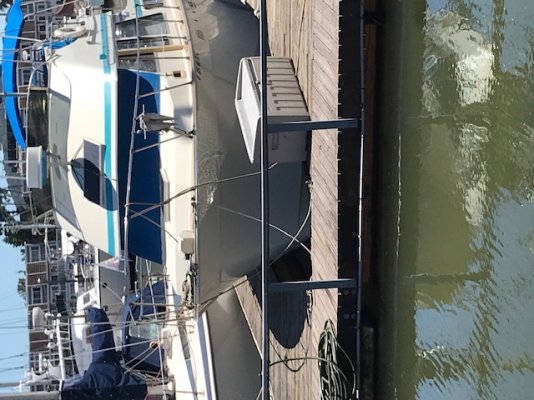Hippocampus
Guru
- Joined
- Jul 27, 2020
- Messages
- 3,908
- Location
- Plymouth
- Vessel Name
- Hippocampus
- Vessel Make
- Nordic Tug 42
TT points out economics are an obstacle. Believe he’s right for
Short term ownership
Brief seasonal use (less than around 7m).
Infrequent use (weekend warriors).
If any of the above are met long, light and lean whether hybrid or not is at a disadvantage.
Believe the above correct if you compare boats by displacement and usable living space. Although some yards charge for winter (or hurricane season) dry storage by square footage slips are usually billed by LOA with more for 1 1/2 to 2 standard slip multi hulls. A Arksen 65 (really more like 68 true inclusive LOA) is comparable in living space to a N475 or a Artnautica 58 to a N41. Costs only wash out toward even if you use the boat a lot, anchor more than berth, live on it for extended times. Otherwise even if diesel rises even further in costs the heavy displacement for LOA would likely be more cost effective.
The cruising segment is small. With the above 3 obstacles even smaller. In some places there’s movement to restrict diesel use (inland waters in Europe as an example) . Still, even with governmental actions this with be a small market.
Short term ownership
Brief seasonal use (less than around 7m).
Infrequent use (weekend warriors).
If any of the above are met long, light and lean whether hybrid or not is at a disadvantage.
Believe the above correct if you compare boats by displacement and usable living space. Although some yards charge for winter (or hurricane season) dry storage by square footage slips are usually billed by LOA with more for 1 1/2 to 2 standard slip multi hulls. A Arksen 65 (really more like 68 true inclusive LOA) is comparable in living space to a N475 or a Artnautica 58 to a N41. Costs only wash out toward even if you use the boat a lot, anchor more than berth, live on it for extended times. Otherwise even if diesel rises even further in costs the heavy displacement for LOA would likely be more cost effective.
The cruising segment is small. With the above 3 obstacles even smaller. In some places there’s movement to restrict diesel use (inland waters in Europe as an example) . Still, even with governmental actions this with be a small market.
Last edited:


